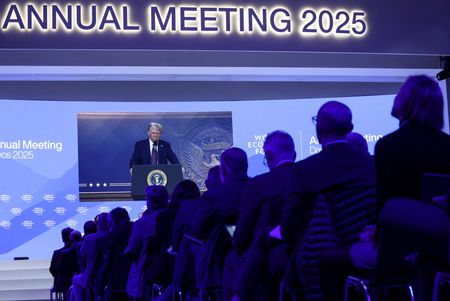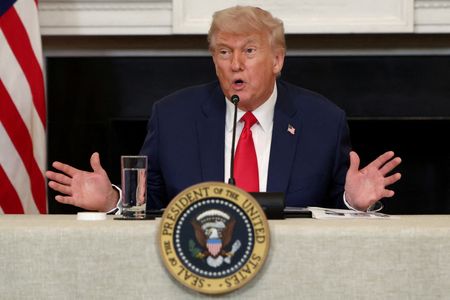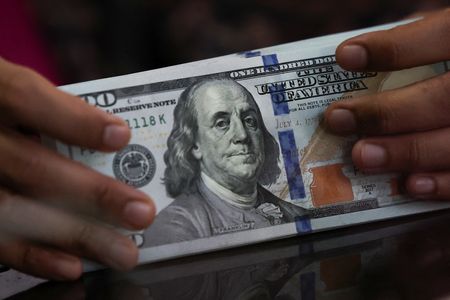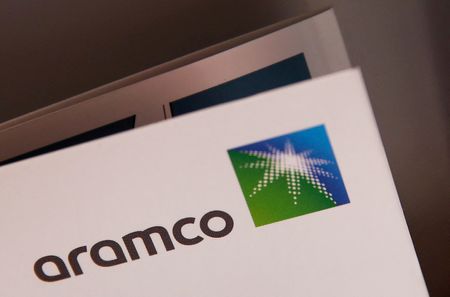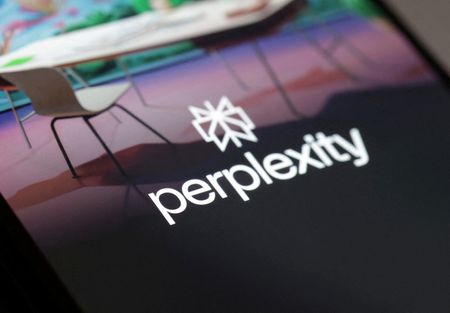By Lananh Nguyen and Ross Kerber
(Reuters) – U.S. President Donald Trump on Thursday accused the CEOs of Bank of America and JPMorgan Chase of not providing banking services to conservatives, echoing Republican complaints about the industry.
The broadside against Wall Street banks comes after some institutions have been accused by both congressional Republicans and Republican-led states of “woke capitalism” as well as de-banking gunmakers, fossil fuel companies and others perceived to be aligned with the political right.
The two banks targeted on Thursday denied they made banking decisions based on politics.
“I hope you start opening your bank to conservatives, because many conservatives complain that the banks are not allowing them to do business within the bank, and that included a place called Bank of America,” said Trump, who returned to the White House on Monday.
“What you’re doing is wrong,” he said, in an address at the World Economic Forum in Davos, Switzerland, via a video link. Trump did not cite evidence or specifics of any wrongdoing, in a question-and-answer session with corporate leaders and CEOs assembled on stage.
He also referenced JPMorgan CEO Jamie Dimon. “You and Jamie and everybody, I hope you’re gonna open your bank to conservatives,” Trump said.
In recent years various financial companies in the U.S.
and elsewhere have tried to respond to growing interest from investors and clients on issues like climate change and workforce diversity.
But institutions have simultaneously faced complaints they unfairly cut off conservative groups over their viewpoints rather than violations of their policies such as bans on promoting violence.
Bank of America CEO Brian Moynihan did not address the claim in comments right after Trump spoke, but he smiled and complimented him on the U.S. hosting the upcoming World Cup.
“We welcome conservatives,” a Bank of America spokesperson said in an email.
“We are required to follow extensive government rules and regulations that sometimes result in decisions to exit client relationships.
We never close accounts for political reasons and don’t have a political litmus test.”
JPMorgan, the biggest U.S. lender, also said it has never and would never close an account for political reasons.
“We follow the law and guidance from our regulators and have long said there are problems with the current framework Washington must address,” it said.
“We welcome the opportunity to work with the new Administration and Congress on ways to remove regulatory ambiguity while maintaining our country’s ability to address financial crime,” a JPMorgan spokesperson said by email.
Singling out specific companies is not unprecedented for Trump, who made a habit of accusing companies like Boeing and Ford of wrongdoing during his first term while praising others that furthered his political aims.
Some in the banking industry said that the criticism could lead to some changes.
Greg Baer, President and CEO of trade group Bank Policy Institute, said it agrees with Trump’s diagnosis that much de-banking occurs as a result of an anti-money laundering and ‘reputational risk’ regime administered by the federal banking agencies.
“We look forward to working with the administration to address this problem and enable banks to provide more services to more customers,” he said.
Raymond James analyst Ed Mills called it highly unusual for a U.S. President to call out financial institutions by name, but said Trump’s comments could be significant as his administration prepares new regulations.
“These comments could be early indicators that expansion of their business to cover some of his preferred industries would be welcomed,” Mills said.
COMPLAINTS FROM CONSERVATIVES
In 2022 JPMorgan came under fire for shuttering the account of the National Committee for Religious Freedom, a non-profit founded by the former U.S.
Ambassador for International Religious Freedom Sam Brownback. Among other things the bank said it wanted “confidential donor information” from the organization, according to a 2024 letter from the Kansas attorney general.
JPMorgan declined to discuss the episode in detail, but a representative said Thursday that it does not discriminate on the basis of political or religious views and that it was a business decision.
JPMorgan last year won credit from conservative groups for changes such as dropping a requirement that merchants using its WePay service not accept payments tied to risks like allegations of racism or sexual harassment.
It also started using language that it serves customers “regardless of political, social or religious viewpoints.”
Investors so far have not broadly supported the matter. At Bank of America, a shareholder resolution last year calling on it to report on “risks of politicized de-banking” won support from only 3% of votes cast, not enough to be resubmitted.
(Reporting by Lananh Nguyen, Caitlin Webber and Katharine Jackson; Additional reporting by Ross Kerber, Pete Schroeder, Nupur Anand, Heather Timmons and Isla Binnie ; Writing by Susan Heavey and Saeed Azhar; Editing by Megan Davies, Richard Chang and Alistair Bell)

